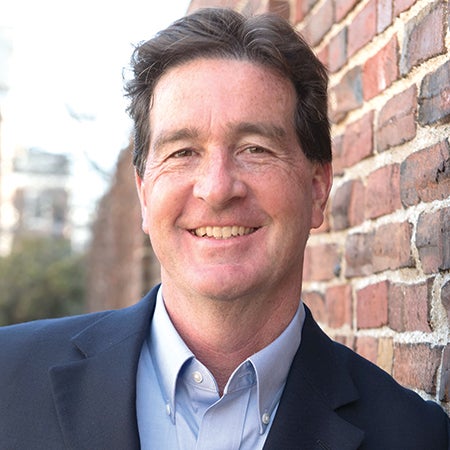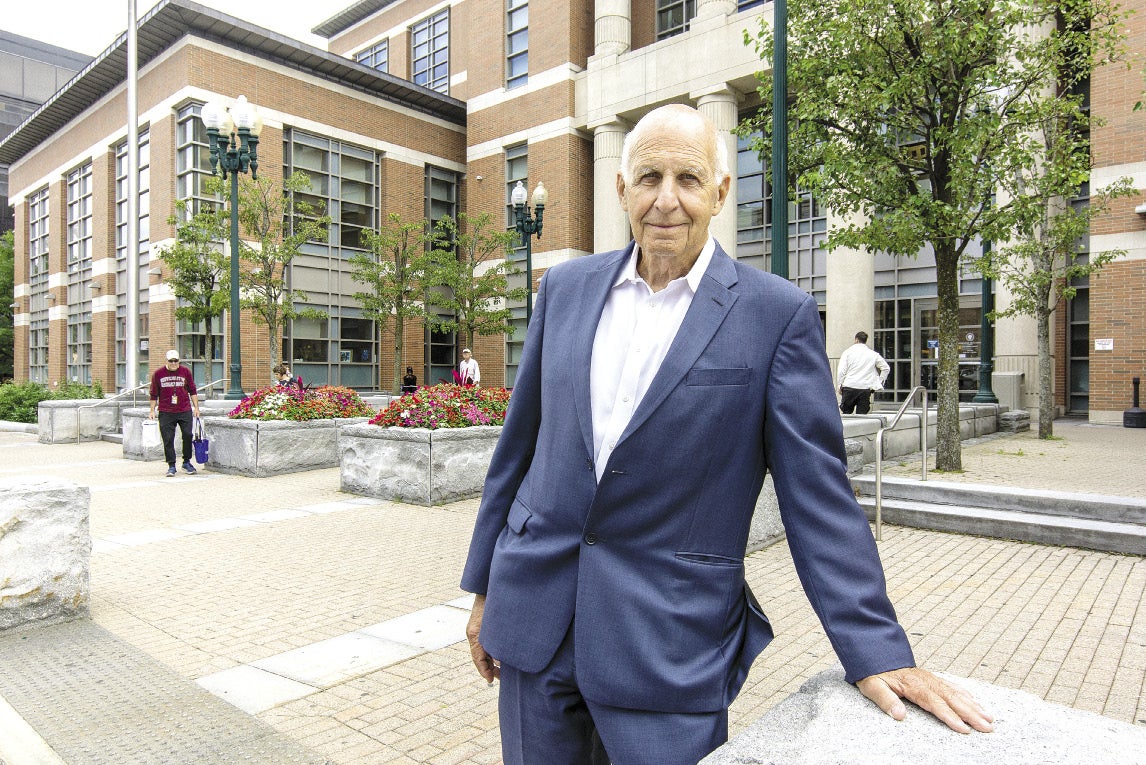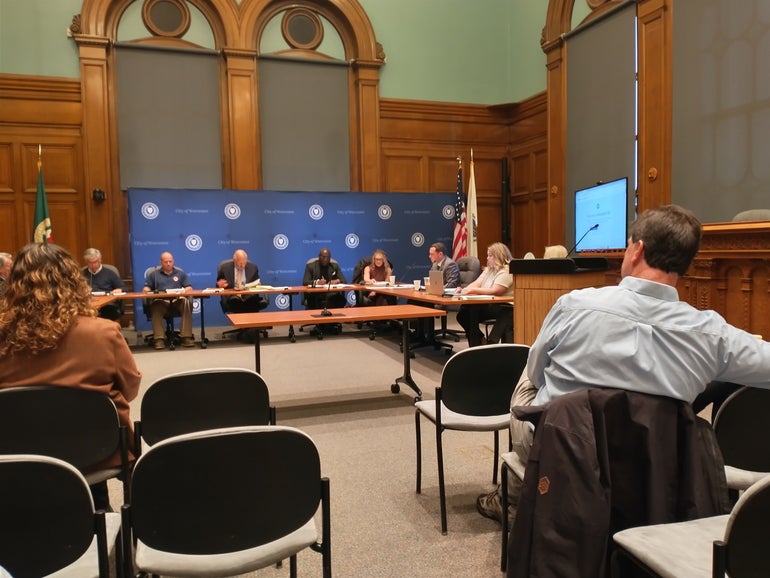Two days after several members of the Worcester City Council criticized Madison Properties for pulling out of a key tax-break deal in the district surrounding Polar Park and a lack of communication from the Boston-based development firm, the Worcester Redevelopment Authority attempted to get answers from Madison regarding the status of several properties key to the plan to fund the $160-million public ballpark.
Madison Properties President Denis Dowdle was in attendance but declined to speak during the Thursday hearing. He was instead represented by his counsel, prominent real estate attorney Mark Donahue, director of Worcester-based Fletcher Tilton PC. During the proceedings, Donahue mostly fielded questions from Michael Angelini, the chair of the Worcester Redevelopment Authority and another key figure in the region’s business scene.
Dowdle declined to speak about the hearing to a WBJ reporter as he exited the room following its conclusion.

Along with former city manager Edward Augustus and the late Worcester Red Sox Chairman Larry Lucchino, Dowdle was once seen as one of three key figures in the effort to bring the minor league baseball team Pawtucket Red Sox to Worcester with a new publicly funded stadium in the Canal District. Dowdle had proposed building five projects in the area surrounding the stadium, and the tax revenue from those projects was supposed to cover the majority of the bond payments to pay for the stadium, which was not supposed to need general taxpayer funds to cover its costs. In exchange for giving the City of Worcester the land to build Polar Park, Dowdle’s firm received millions of dollars in tax breaks and waived permitting fees.
When now City Manager Eric Batista revealed ahead of Tuesday’s City Council meeting that the ballpark district had a $792,000 revenue shortfall and would need to rely on the general fund to make payments, most of the City Council’s ire fell on Dowdle, who had terminated one of his development agreements.
Angelini began the WRA meeting with an opening statement, where he outlined the timelines for completion of construction he said Madison signed off on in part of its agreement with the City, including the firm’s plans for a hotel and a second residence building on Madison Street. The hotel was originally slated to be complete by May 2024, while the second residence was slated to be completed by the end of 2023.
He expressed concern Madison was not capable of following through on its commitments, noting the company was required under agreements with the City to construct the core, skin, and shell of the so-called Left Field Building.
“This [hearing] is about a couple of things,” Angelini said, “It’s about confidence moving forward. It’s about confidence in our partner. It’s about accountability. It’s also about money.”

Donahue began the hearing by acknowledging Madison had failed to meet its obligation to construct the Left Field Building but declined to commit to a proposal from Angelini that the firm pay taxes on the parcel equivalent of the tax rate had the building been completed.
Moving his attention to Madison’s yet-to-be constructed second residential building across Madison Street from The Revington, a 228-unit apartment completed by Dowdle, Angelini asked for more details on why that project hasn’t moved forward, chastising the firm for refusing to construct the building or provide concrete updates on its status.
“What is Madison’s excuse for not having built that building?” he asked Donahue, who replied the firm was focusing on stabilizing The Revington, an answer that failed to satisfy Angelini.
“There’s no reason I can think that Madison should be excused for not doing what it said it would do. We don’t have a hotel. We don’t have a laboratory built. We don’t have a Left Field building. We don’t have a second residential building,” Angelini said.
Angelini expressed particular frustration he could not get a satisfactory answer from Madison in regards to the cause of the delay for the second residential building
Donahue said the firm was still committed to constructing the building but would only do so when it had felt it was ready and had financing in place. He said the firm was prioritizing completion of the hotel project before turning its attention to the second residential building, despite the fact agreed-upon timelines required Madison to be working on multiple Polar Park area projects at once.
“So you’re telling me that Madison will do what it wants to do, when it’s ready to do so,” Angelini said. “Is that the takeaway from the meeting?”
“Madison will do as Madison has since the project started,” Donahue replied. “It has pursued diligently and doggedly every effort to utilize every component of this property, chase down every opportunity, and continue to seek ways that it can both pay taxes to the City and pay a return to its investors in an orderly fashion.”

Moving back to the topic of the Left Field building, Donahue outlined efforts Madison had taken to make the building work, first by pursuing potential tenants who were interested in occupying the proposed unique office space overlooking the ball field.
Donahue said the company then attempted to pivot the building’s purpose to being a life science center, but stated recent difficulties in that sector have led to an abundance of available existing life science-focused properties in the region, drying up demand for newly constructed space. He took issue with the fact Madison would be required to construct a building with no tenets or clear path toward occupancy lined up, a statement that riled Angelini.
“You should have said that when you signed the agreement that said we shall [construct the building],” Angelini said. “This is not the time to revisit the agreement. The word ‘shall’ does not mean ‘maybe.’”
The hearing concluded without the WRA taking any action in regards to Madison, with Angelini noting the need for a discussion with the City’s legal counsel and taking issue with the firm prioritizing its own financial well-being over its commitments to the City.
“I don’t know where we go from here,” Angelini said. “This is not going to work.”
Eric Casey is the managing editor at Worcester Business Journal, who primarily covers the manufacturing and real estate industries.

